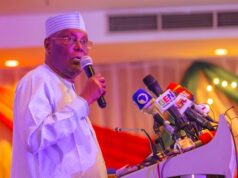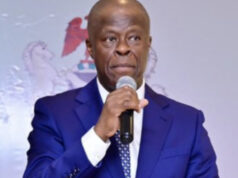By guile and intrigue, the ghost of power shift agitation is back to life again and kicking. Both the opposition Peoples Democratic Party (PDP) and the ruling All Progressives Congress (APC) are now unsettled by the unsettlement of the nagging question of where the next president would come from after the expiration of the tenure of the incumbent President Muhammadu Buhari in 2023.
Though unknown to the Nigerian Constitution, the PDP had enshrined the gentle’s arrangement in its constitution to give each geo-political zone of the country a fair sense of belonging. That followed the prolonged political brouhaha occasioned by the annulment of June 12, 1993 presidential election believed to have been won by the late Chief MKO Abiola by the military junta. Consequently, at the advent of the present democratic dispensation, the party conceded the coveted seat to the South-West to appease the Yoruba for the perceived injustice and thus paved the way for the emergence of Gen. Olusegun Obasanjo (rtd) as an elected president in 1999. The rotational agreement, however, suffered momentarily setback with the demise of President Umaru Yar’Adua and the subsequent ascension of Goodluck Jonathan to power. In 2015, the Northern opposition to Jonathan’s second-term ambition nailed the coffin but was resurrected by the APC through the emergence of Buhari.
In keeping faith with the arrangement, power is expected to shift back to the South after the eight-year tenure of the Buhari administration. But intriguingly, most of the leading frontrunners seeking the presidential ticket of the PDP are largely people of Northern extraction, giving an indication that the arrangement might have been covertly altered ahead of the 2023 general election. So far, prospective aspirants who have indicated their interests in the contest include former Vice President Atiku Abubakar, Governor Aminu Tambuwal, Sule Lamido, Governor Bala Muhammed, and Bukola Saraki, among others.
Although the insinuation about the plot to concede the slot to the North has been debunked, stakeholders in the South believe that the decision by the party to set up a special committee to work out the zoning arrangement is diversionary, unnecessary and a waste of time. They are often too quick to refer to the intrigues that culminated in the report of the 2019 Election Review Committee led by Governor Bala Muhammed of Bauchi State, which had recommended merit as a major criterion for the choice of the presidential flag bearer of the party for the 2023 elections.
A source within the party, who pleaded anonymity, while speaking with our correspondent, said: “The motive for setting up of a committee on zoning is suspect; it smacks-off lack of respect for the rules of the game. For me, the outcome of the committee is predictable. Simple logic demands that the ticket should go to the South after the eight-year tenure of President Muhammadu Buhari. But we have a subsisting report of Governor Bala Muhammed-led committee which recommends that the PDP must conduct credible national presidential primaries, arguing that there are capable individuals all over the country who can provide the right leadership for Nigeria. That is contrary to the original intention of the founding fathers of the PDP who put zoning arrangement in the constitution. It is not about whether or not a particular section has the monopoly of competent persons; it is about fairness, justice, and equity. I think we need to tread softly to avoid creating a crisis that can ruin our chances in the 2023 elections.”
Already, the insurrection within the National Working Committee of the PDP against its embattled National Chairman, Prince Uche Secondus has been linked to his alleged surreptitious move to concede the presidential ticket to Atiku Abubakar, a development that provoked the indignation of the Rivers State governor, Nyesom Wike.
Wike’s handwriting could be seen in the recent conflicting ex parte orders issued by six courts of coordinate jurisdiction stopping Secondus from parading himself as the National Chairman. “Mr. Quality Project” is one of the major financiers of the PDP whose presidential ambition has become an open secret. All entreaties to reconcile him with Secondus have proved abortive.
If the suspension order slammed on Secondus is eventually upheld by the court of competent jurisdiction, the North will likely fill the slot at the convention slated for October going by the decision of the PDP governors.
One other permutation that might likely encourage the PDP to give preference to the Northern aspirants is the presumption that the presidential ticket of the APC would be zoned to the South in line with the unwritten agreement Buhari had reached with some state actors in the run-up to the 2015 general election. It is on the basis of that understanding that the loyalists of the national leader of the APC, Asiwaju Bola Ahmed Tinubu, under the aegis of the South West Agenda for Asiwaju (SWAGA) have been leading the campaign for power shift to the South-West. Tinubu was instrumental to the emergence of Buhari and it is highly expected that the president will reciprocate the gesture in 2023.
But the President’s body language appears to be on the contrary. For instance, while on an official visit to Lagos in June, Buhari had declared that no one single individual would dictate where the party’s ticket would go. “You can’t sit in Lagos, for instance, and decide the fate of APC on zoning, he stated in an interview with Arise TV. The statement came as a rude shock to some of Tinubu’s followers who felt it was a betrayer of trust.
Discordant tunes have since set in between the forces of change and forces of the status quo. Stakeholders from both sides of the divide have been arguing back and forth about the expediency of the power shift. While the pro-North group insists that the party should go for the competent candidate regardless of the place of origin, their counterparts in the South maintain that the agreement must be respected.
President Buhari’s nephew, Mamman Daura, had sometimes ago deliberately roused the rabble when he called for the jettisoning of the zoning formula, saying merit and competence should be used to elect the next president. “This turn-by-turn was done once, it was done twice, and it was done thrice. It is better for this country to be one. It should be for the most competent and not for someone who comes from somewhere,” he was quoted as saying in an interview with the BBC Hausa Service.
But a member of SWAGA who spoke with The Star in confidence said: “For me, APC has no reason not to respect the agreement whether written or unwritten because everything is based on trust. And I believe that the Buhari I know will not want to renege on his promise to support Tinubu in his presidential ambition. South-West deserves the support of all and sundry. But if our efforts to make them see the reason why the South-West should be given the ticket, we will encourage Tinubu to explore “Plan B”. We are waiting for him to make a formal declaration.”
Though Tinubu, who is currently on medical treatment in London for an undisclosed ailment has not made a formal declaration of his intention to run for the presidential race, his supporters have set up structures for electioneering, putting pressure on the APC leadership to cede the presidency to the South-West.
Aside Tinubu, there are also rumoured ambitions of other prospective contenders like Vice President Yemi Osinbajo, Governor Kayode Fayemi of Ekiti State, his counterpart in Ebonyi State, Dave Umahi as well as Minister of Internal Affairs, Ogbeni Rauf Aregbesola, to mention but a few.
Amidst all the scheming, indication has emerged that the party might have resolved to adopt a consensus arrangement to choose its presidential flag bearer to forestall the looming threat of implosion. But the party hierarchy who made the disclosure remained silent on the power shift controversy.
Conceived as a means of fostering unity among different ethnic nationalities, there is no gainsaying that the demand for power shift is a panacea for a stable polity. This is even more so now that separatist agitations arising from the perceived marginalization of some sections of the country have assumed a threatening dimension.
Beyond that, the issue of power rotation is purely a political matter that can only be resolved through dialogue, consultation, and re-alignment of forces. Even granted that the North concedes power to the South, how the state actors in the region would agree to work together on a consensus candidate as to deliver a bloc vote is an issue that borders many stakeholders. The big question is: who will concede what and to whom? Out of the three geo-political zones in the South, only the South-East has not taken a shot at the presidency since the advent of the present political dispensation. The closest the region has ever had was the vice presidency of the late Alex Ekwueme. Even the six-month military regime of the late Gen. Aguiyi Ironsi is often best referred to in history as an interregnum. Based on this perceived marginalization of the region, the campaign has been on for consideration for the president of Igbo extraction.
A former governor of the old Anambra State, Dr. Chukwuemeka Eziefe, in a telephone interview, expressed strong hope that 2023 would offer an opportunity for Igbo to govern the country. Apparently banking on the support of the South-South and South West, he said: “Now that South-South, South-West and Middle Belt are throwing their weights behind Igbo presidency, it is now left to Ndigbo to unite and achieve the target in 2023.”
But an estranged former political associate of President Buhari, Buba Galadima, speaking in the same vein dismissed the sentiment, saying, “I have a lot of friends from the South-East, I can vote for any of them if they present themselves, but I do not agree with Igbo presidency.”
In the face of all of these, concerned individuals in the ruling APC and PDP are generally apprehensive that taking a hasty decision on the zoning of the presidential ticket to the North or the South could further spell doom for their parties.
- Ijaw youths raise the alarm: Oil thieves after Kyari, Tompolo, Otuaro - December 22, 2024
- Abuja stampede: Wike commiserates with victims, directs free treatment - December 21, 2024
- Uba Sani Signs Executive Order, raises academics’ retirement age to 65 - December 20, 2024










